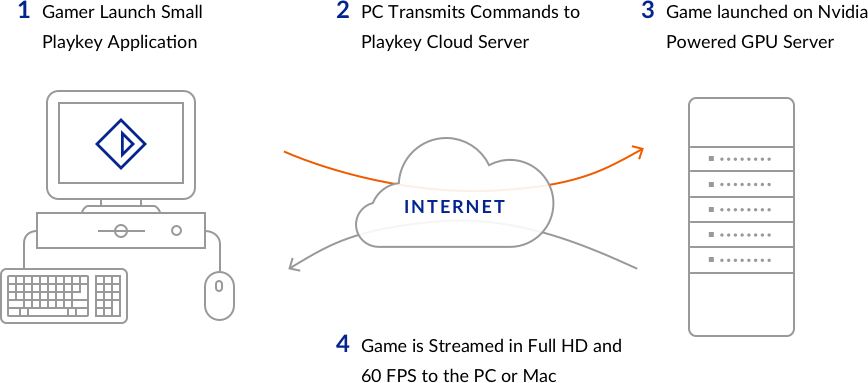Playkey Game Berbasis Cloud
Hai sahabat Blogger selamat pagi. Hari ini saya akan sedikit berbagi info bagi para Gamer. info itu ada Playkey Sebuah Game berbasis Cloud.Revolusi Game Menuju CLoud
Saat ini di berbagai industri hampir semua sudah berbasis Cloud, seperti industri musik, video dan layanan lainnya, begitupun dengan dunia gamer tidak lama lagi akan berbasis cloud. Permintaan teknologi Cloud untuk game pun tidak terelakkan, penyebabnya adalah sebagian PC yang di gunakan oleh para gamer adalah PC yang menggunakan teknologi lama sehinga tidak bisa memainkan game yang memiliki resolusi tinggi, menurut survey yang di peroleh 70 persen gamer tidak dapat memainkan game game kesukaan mereka karena terkendala hal di atas. untuk mendapatkan informasi mengenai survey di atas silahkan kunjungi situs Playkey.io
Playkey dalam pemanfaatan teknologi Cloud
1. Memungkinkan semua gamer untuk memainkan game yang mereka inginkan, pada perangkat apa pun yang terhubung ke internet, menggunakan model awan terdesentralisasi, dengan memanfaatkan teknologi, produk, dan bisnis Playkey yang ada. disini dapat di ambil kesimpulan apapun perangkatnya dan se usang apapun spesifikasi dari hardware yang di gunakan selama si gamer terkoneksi internet maka dia akan tetap memainkan game yang di inginkannya.
2. Membuat platform dan pasar terbesar di dunia untuk semua penyedia perangkat keras, gamer, dan para peserta di industri cloud gaming yang sedang berkembang.
3. Menyediakan ekosistem terdesentralisasi dengan platelet inti untuk para miner dan gamer, berdasarkan teknologi blockchain, yang menyediakan pemilik GPU swasta / profesional dengan cara baru untuk mendapatkan uang. Cara yang lebih efisien, lebih stabil, dan kurang berisiko dibandingkan dengan pertambangan kripto, sekaligus memberi gamers cara yang bisa diandalkan untuk bermain game AAA, tanpa menggunakan perangkat keras generasi terbaru. Itulah 3 hal yang menjadi tujuan dari Playkey. di bawah ini adalah gambaran dari pemanfaatan teknologi cloud oleh Playkey

The Playkey Cryptocurrency (The PKT Token)
Tujuan dan deskripsi token Playkey
Playkey memperkenalkan token kriptografi open source PKT. PKT adalah kripto yang akan digunakan untuk membeli dan menjual langganan game cloud serta layanan Playkey lainnya. Ini akan menjadi unit akun untuk semua transaksi ekonomi dalam Ekosistem Playkey, dan akan digunakan sebagai dasar interaksi dengan layanan digital lainnya. PKT adalah non-inflasi jangka panjang. unit-unit PKT adalah dapat dipindah tangankan, sehingga diharapkan dalam melakukan perdagangan pertukaran kripto. PKT akan diimplementasikan di blokade ethereum publik sesuai dengan ERC20 (Ethereum Token Standard). Setiap token yang diimplementasikan sesuai dengan standar ERC-20 kompatibel dengan infrastruktur ekosistem Ethereum yang ada, yang memungkinkan penerapan cepat dan mudah.
Peluang Penggunaan Token PKT
1. penggunaan jangka pendek
Untuk jangka pendek, PKT akan digunakan untuk transaksi antara penambang dan gamer, dan pembelian perangkat lunak game. Untuk tahap pertama, Playkey akan mengintegrasikan wallet PKT ke semua akun Playkey dan akan mentransfer semua transaksi ke PKT sehingga di harapkan Diharapkan token PKT akan dibeli oleh para gamer di bursa kriptocurrency, atau di situs resmi Playkey.io.
2. jangka menengah
Dalam jangka menengah, Playkey akan mendesentralisasi infrastruktur. Server yang dibeli oleh Dana Pembangunan setelah ICO akan dilelang terbuka, dan setiap pemegang PKT akan memiliki kesempatan untuk membeli kapasitas komputasi yang akan menghasilkan pendapatan bagi pemiliknya. Selain itu, setiap penambang akan dapat membuat kontrak cerdas mereka sendiri untuk menarik uang dari pemegang PKT dan memberi kesempatan kepada gamer / masyarakat untuk mendanai penambang profesional lokal regional mereka sehingga dapat meminimalkan latensi dan memaksimalkan kualitas layanan streaming.
3. jangka panjang
Dalam jangka panjang, Playkey akan memperluas ekosistem untuk memperluas pemasaran, pengembangan game dan penerbitan, mata uang dalam game, e-sport dan live stream, aplikasi dan pembuatan konten. Tujuan utama dari Playk ekosistem adalah untuk memberikan keuntungan dan keuntungan bagi semua peserta, yang akan mendorong pertumbuhan jumlah penyedia layanan dan pengguna platform.
About the Author
BTT account name :ardi65









